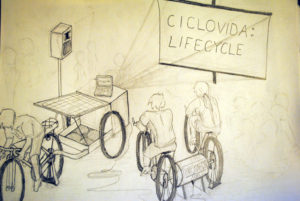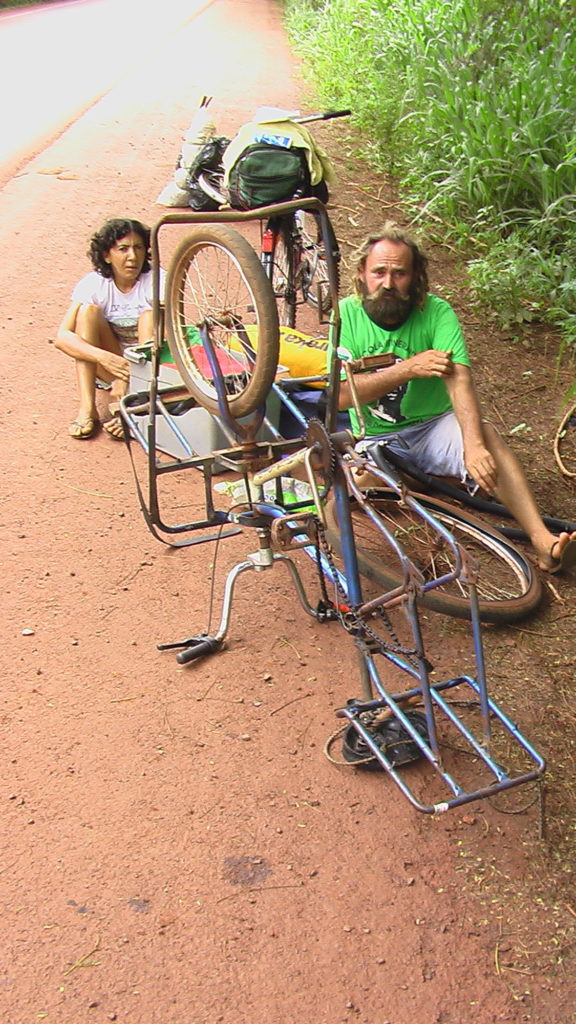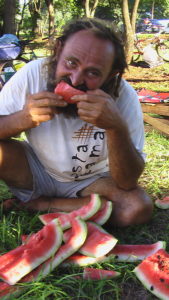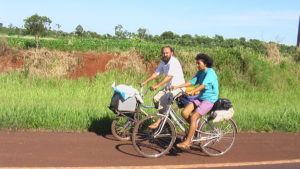About Ciclovida: Lifecycle
A MOVIE AND A MOVEMENT
FOR NATURAL SEEDS AND A NEW RELATIONSHIP WITH THE LAND
Ciclovida: Lifecycle is a documentary film that tells the story of a group of small farmers from northeastern Brazil who embark on a bicycle trip across the South American continent. They seek to exchange natural seeds and ideas about new ways of relating to the land. Each day they gather moving stories from landless peasants, indigenous communities, and small farmers who are struggling to survive despite the conquest of global agribuisinesses, large-scale biofuels and genetically modified crops.
The film is a collaboration between US filmmakers, Matt and Loren Feinstein (brothers) and the farmer-activists in Brazil.
The project has included:
- Creation of a feature documentary film.
- A tour of the eastern US with pedal powered screenings and discussions with the filmmakers and protagonists.
- An all women cross-country bike tour.
- A tour to dozens of indigenous communities in Guatemala.
- Several delegations to Ceará, Brazil and encuentros (activist gatherings) that included natural building intensive workshops and more.
- Fundraising of tens of thousands of dollars for grassroots movements in Brazil.


PLOT SUMMARY
A summary of the feature documentary film.
01
THE CHARACTERS
The film begins with a focus on character development, and the viewer is introduced and becomes attached to the charismatic protagonists, Inacio and Ivania, and their struggle to survive and progress in the physically, politically, and socially challenging environment of rural Northeastern Brazil, one of the poorest regions of South America. The underlying pressures of industrial agriculture, with a focus on biofuel crops, are explained in detail, including the historical groundwork that was laid by the old imperial governments. Land struggle movements are described, with close attention to the reasons that compel farmers to use cash-monocrops and stray from subsistence agriculture. In particular this film intimately portrays the economic and ecological impacts of such farming practices and their implicit uses of chemical fertilizers and pesticides and genetically modified seeds from the protagonists’ point of view.

02
the plan
Inacio and Ivania devise the idea and plan for the bicycle journey to Buenos Aires, Argentina and back, over 5,000 miles. They describe their philosophy of respectful relations with the Earth and other people as the basis for their mode of transportation and the need to gather natural seeds and create networks for future sharing of ideas and seeds as the motivation for the voyage.

03
the trip
The film then follows the protagonists as they embark on their journey south through Brazil, across the borders of Paraguay and Argentina to Buenos Aires and eventually back home to Northeastern Brazil, stopping along the way to gather novel ideas, seeds, and touching stories from landless laborers, agricultural schools, small farmers, and other supporters sympathetic to their cause.

04
the return
This feature runs the emotional gambit from the darkest depressing fears of ecological and economic devastation to the uplifting joy of a triumphant return and successful undertaking that spreads an intellectual and tangible wealth amongst dozens of poor communities and thousands of small farmers. It also touches on the personal aspects of the trip for Inacio and Ivania, as they struggle wit their own fears of failure, loneliness and separation fro family and friends, and isolation from the mainstream culture.
With the growing and dispersal of the gathered seeds after protagonists return, there is a celebratory feel to the ending, while the need for the continued restructuring of environmental and social relationships is conveyed.

